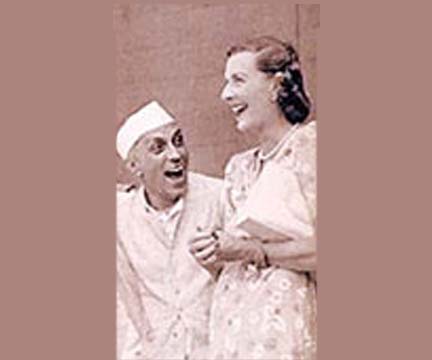Two-timing icons
 Jawaharlal Nehru and Edwina Mountbatten smooching on the settee. If those nine words haven’t already burnt a hole in your (now suddenly ex-, eh?) favourite newspaper, read on.
Jawaharlal Nehru and Edwina Mountbatten smooching on the settee. If those nine words haven’t already burnt a hole in your (now suddenly ex-, eh?) favourite newspaper, read on.
In the early 90s, when the net had holes and the sky was blue and your (now suddenly ex-, eh?) favourite incomprehensible Sunday columnist was working in a chummy Calcutta newspaper, there was a big kerfuffle when a Bengali daily published extracts of letters written by Subhas Chandra Bose to a woman named Emilie Schenkl.
Bengalis have a special relationship with Netaji Subhas Bose© and it was wonderful, many of us thought, that a publisher had finally brought to light, outside the table lamps of academia, these personal letters that made the icon so touchingly human. “I have been longing to write to you for some time past — but you can easily understand how difficult it was to write to you about my feelings... Not a single day passes that I do not think of you, You are with me all the time. I cannot possibly think of anyone else in the world,” read one such missive, showing Bose yearning for the lady he loved.
The published letters struck me as a wonderful antidote to the stiff, iconic, uniform-ed ‘Netaji’ whose tacky pictures (elevated to ‘kitsch’ collectibles these days) adorned many a calendar on the wall. His words actually elevated the figure of Bose in my ranking of historical heroes.
Well, try telling that to the Forward Bloc blokes who were up in arms the same day, burning copies of the ‘lascivious’ newspaper that had published ‘scurrilous’ extracts of their party founder’s letters. They seemed confused about whether they were angry because Bose’s private letters had been made public, or because he had been exposed as a flesh’n’blood’n’hormones man. What they didn’t seem confused about at all was that every copy of the newspaper had to be destroyed.
It’s true that Bose secretly married Schenkl, an Austrian, on December 26, 1937. Schenkl later explained that any public announcement would have caused “unnecessary upheaval,” especially at a time when Bose knew that he would become president of the Indian National Congress in 1938. But more than 50 years later, was it such a cataclysmic thing for people, including admirers of Bose, to know that the great man loved his wife? Nein, meine dumme Kumpel!
The latest noise over a feature film on the ‘relationship’ between Jawaharlal Nehru and Edwina Mountbatten is thankfully less cacophonic. Alex Von Tunzelmann’s Indian Summer (on which the proposed Nehru-Edwina film’s script is based on) isn’t the only book that talks about the ‘private’ affair. The fact that the two loved each other is well-documented.
But popular reaction doesn’t stem from document-reading. It comes from things like a ‘film version’ or a ‘media report’. (Which explains why I haven’t become a household name even after suggesting in a novel that freedom-fighter Kshudiram Bose and his fellow bomb-throwing boys were rather hopeless at getting the right targets.)
But the rather moronic objections to the film’s script from the Information and Broadcasting Ministry are on the old, well, moronic lines of ‘Arrey baba, how can you show Chacha Nehru loving a woman, and another man’s wife at that?’ One history-type even suggested that a film on the relationship between two historical figures can only be made if the relationship impacts “the course of events”.
I have a theory about why we flinch each time a national icon is shown possessing human qualities. We find it horrific to consider that such a ‘parental figure’ could have had an erotic, psychosexual relationship with anyone else but the nation. Essentially, we want our icons to only sleep with us.